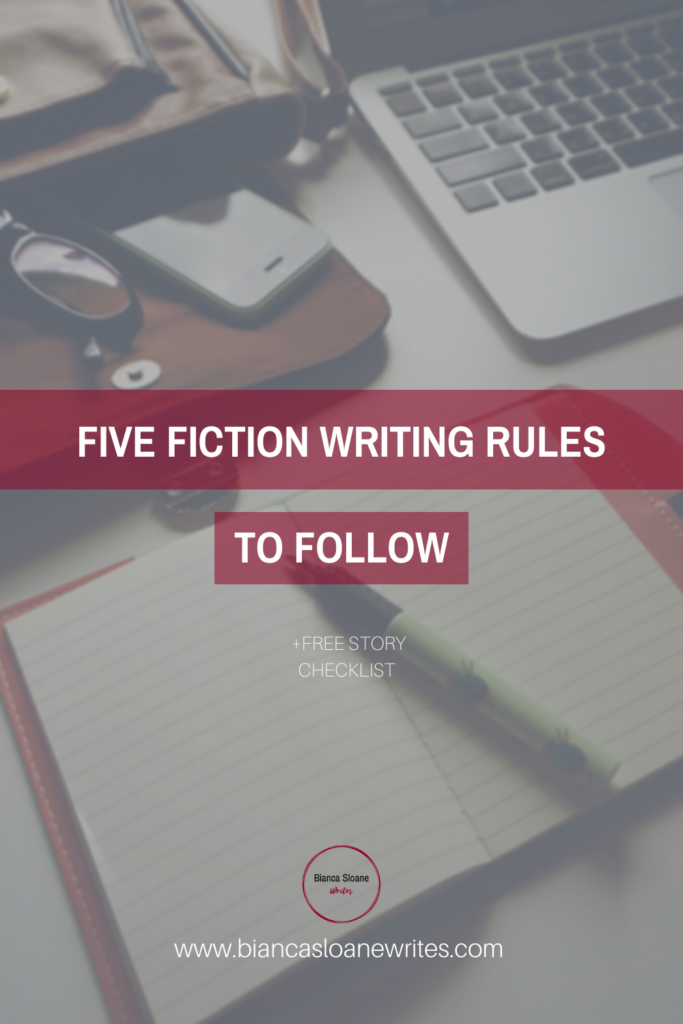Five Fiction Writing Rules to Follow
As the saying goes, rules are meant to be broken and fiction writing is no exception (see my post “Four Fiction Writing Rules to Break”).
There are a LOT of rules newbie writers are commanded to follow and it can feel like an avalanche. Sometimes, it’s necessary to break the rules (protagonists can be unlikeable, you can start your story with dialogue, you can write chapters in alternating 1st and 3rd POV, you can write non-linear stories) in order to tell a stronger, more interesting story. Carrie from “Sex and the City” is highly unlikable. So is Amy from “Gone Girl.” The four protagonists of “Waiting to Exhale” tell their stories with two speaking in first person, the other two in third person. “This is Us” has elevated non-linear storytelling to new heights.

Sometimes, rules exist because they work and you’d be remiss not to follow them. The trick is figuring out which is which.
Below are five writing rules you should always heed:
1) Write
Seems like a no-brainer, right? If you want to be a writer, you must write. It’s just that simple. Talking about writing is not writing. Waiting for inspiration, is not writing. Telling everyone about the book you plan to write, but haven’t actually written, is not writing.
Writing, no matter how bad the words and sentences and paragraphs are, THAT is writing. You can’t edit something that doesn’t exist, so butt in the chair, fingers on keyboard (or pen to paper, if you prefer) and WRITE.
Go through your current manuscript and mow down the filler. Do you really need two pages of back story, or can you convey it in a paragraph?
2) Read
Stephen King (among others) says new writers will likely write what they enjoy reading. I write suspense novels, so that makes up the bulk of what I read. However, I enjoy reading all types of books across a variety of genres.
A big reason why reading is so important is it will help your writing. It can help you separate good writing from bad. It gives you something to aspire to (while cultivating your own voice, of course) and can provide a roadmap of sorts for where you might be trying go. Analyzing how the writer sets up themes and plots, how they developed the characters, how they structured the story, can point you in the right direction and provide fresh inspiration for an aspect of your story you might be struggling with. Mary Higgins Clark says she learned how to write mysteries by studying Daphne du Maurier’s “Rebecca.” Clearly, she’s done all right.
Read, read, read. Then read some more.

3) Kill Your Darlings
This is a hard one. Oh, so hard.
As writers, we often fall into the trap of believing every word is sacred and we’ll stab anyone in the eye who tells us to cut even a comma from our prose.
Hard as it is, though, we have to get over that possessiveness.
It can be tough to hit that delete key and wipe away hours of blood, sweat, and tears. However, the whole point of a good story is to keep the action moving. Soliloquies, monologues, and waxing poetic about the back story or details of a room can bring everything to a grinding halt.
Go through your current manuscript and mow down the filler. Do you really need two pages of back story, or can you convey it in a paragraph? Is your prologue killing your story? Is that supporting character REALLY necessary? Does the speech you gave your antagonist really need to go on for a full page?
Granted, it will be easy to kill some of your darlings. And others should just die a natural death. Or be murdered. Whatever works.
4) Kill the Adverbs
Stephen King, Elmore Leonard, and Mark Twain all advocated for this justifiable homicide and they’re right.
It feels so descriptive to tack on adverbs (i.e. the words ending in “ly.”) We want our characters to “agree reluctantly,” “jump quickly,” and “hastily add.” When they’re speaking, we want them to “sneer,” “spit,” and “pant.” It feels boring to only use “said” as attribution, right?
. . . if your manuscript is littered with [adverbs], kill them before they kill your story.
As King points out in “On Writing,” the reason writers (himself included) use adverbs, is because, “I am afraid the reader won’t understand me if I don’t. I’m convinced that fear is at the root of most bad writing … Good writing is often about letting go of fear and affectation.”
That said, killing your adverbs is one of those bendy rules; sometimes there’s no way around using one (or two). However, if your manuscript is littered with them, kill them before they kill your story.
5) Write the Book You Want to Read
“If you find a book you really want to read but it hasn’t been written yet, then you must write it.” – Toni Morrison.
Don’t like the way women are portrayed in science fiction? Write the female protagonist YOU want to see. Wish there were more multicultural YA books? Write them. Tired of a grizzled, drunken homicide detective always being the one to solve the crime? Write a book where the honor goes to someone else (see my novel “Killing Me Softly.”).

While it may sometimes feel that everything has been done before, it’s really all about what spin YOU can put on what came before. Legal thrillers weren’t new, but John Grisham blew the doors off with his page-turners. Truman Capote smashed true crime wide open with his nonfiction novel, “In Cold Blood.” Quentin Tarantino pretty much redefines movies with each new film he makes.
Just because something hasn’t been done before, doesn’t mean it can’t be.
What are some of the writing rules you’re a stickler for?

Pin this for later!

